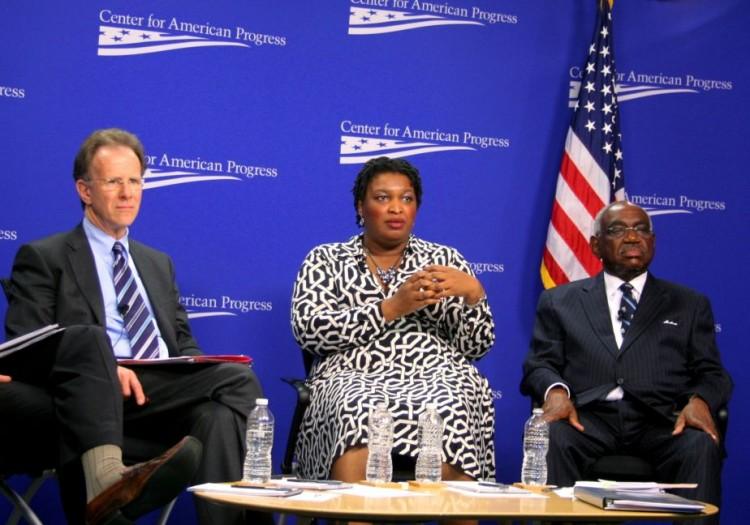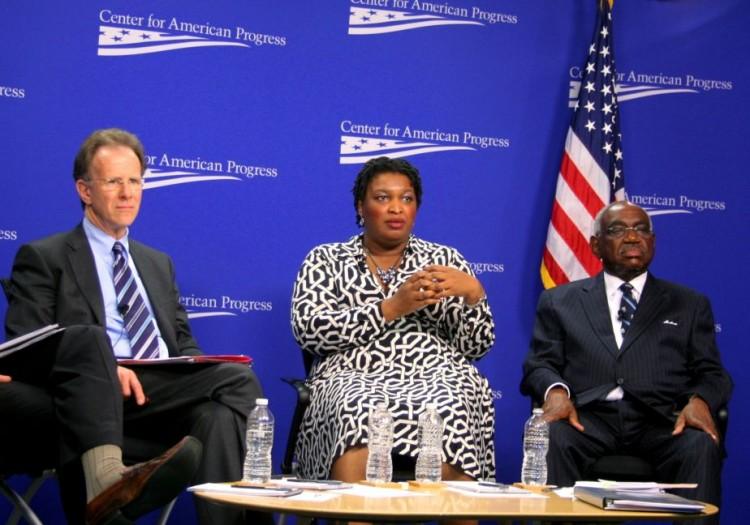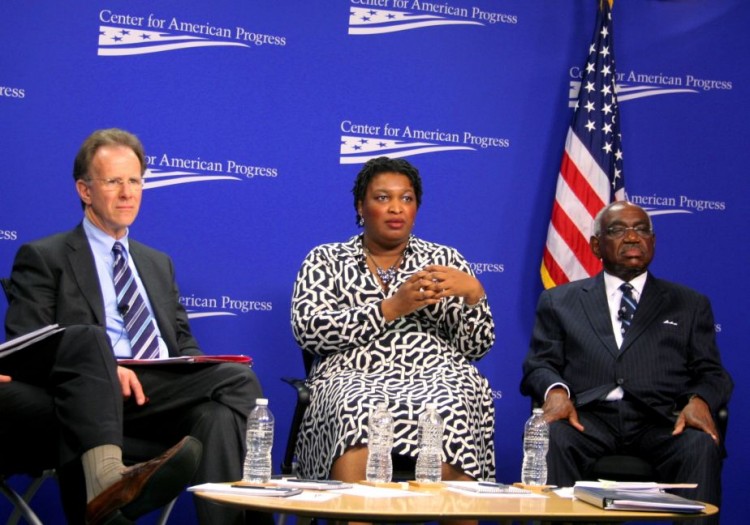WASHINGTON—On April 25, the Supreme Court will hear oral arguments on Arizona’s immigration enforcement law. The legislation was signed on April 23, 2010 by Gov. Jan Brewer (R-Ariz.), who said Arizona needed to do something to stem the flow of illegal immigrants through a policy of “attrition through enforcement.”
The idea is to make life so miserable for undocumented aliens that they will get up and self-deport. But critics of the law say it can also make life hard for citizens and legal immigrants, as it encourages racial profiling, and preempts the authority of the federal government to enforce national immigration laws. Others add that Arizona’s immigration law and copycat legislation in other states—Alabama, Georgia, South Carolina, and Utah—cause losses in the state economy and an unfriendly business climate.
The most controversial provision in the Arizona law S.B. 1070 requires state law enforcement officers to verify the immigration status of every person who is stopped, detained, or arrested “where a reasonable suspicion exists that the person is an alien and unlawfully present in the United States.” The individual is held until the suspect can prove his or her citizenship or lawful status.
The state law goes beyond federal law “by effectively requiring everyone, including citizens, to carry documents proving immigration status,” said Marshall Fitz and Jeanne Butterfield, in one of two papers released on April 4, by the Center for American Progress (CAP).
The Southern Poverty Law Center filed a brief with the Supreme Court, which argues that “law-abiding Americans, particularly minorities, will be subject to constant scrutiny, lengthy detentions, and false arrests.”
SPLC used the example of Jim Shee, “a lifelong Arizonan of Spanish and Chinese ancestry, who was stopped for no apparent reason and questioned by a Phoenix police officer, who demanded to see his ‘papers.’” While Shee was not given a citation, just 10 days later he had to endure the ordeal again in Yuma.
“S.B. 1070 will transform routine traffic stops into ’mini-trials,' where detained citizens bear the burden of proving their immigration status, and will harm racial and ethnic minorities in particular,” says the SPLC brief.
Critics say that “show me your papers” laws turn the clock back on the country’s progress in treating citizens equitably. Persons of color who speak with a foreign accent will come under “reasonable suspicion,” say Fitz and Butterfield. They argue that state immigration laws “require law enforcement to engage in racial and ethnic profiling of the state’s residents or visitors.”
Police will be seen as “agents of ICE [Immigration and Customs Enforcement],” said Lucas Guttentag of the Robina Foundation, who spoke April 4, on a CAP panel on racial profiling and the Arizona Immigration law.
Alabama has the strictest state immigration law in the nation. CNN reported that in November 2011, a German Mercedes-Benz executive was driving a rental car and was pulled over by the Police in Tuscaloosa, Ala. When he could not immediately produce proof of his lawful visitor status, he was arrested and detained until he could provide proper documentation.
A few weeks later, a Japanese employee from Honda was stopped by Alabama police. He was ticketed even though he showed an international driver’s license, passport, and U.S. work permit, according to Outside the Beltway.
The CNN article said that opponents of the new immigration law similar to Arizona’s legislation used the executive’s arrest as proof that the new law will scare businesses away from Alabama rather than create jobs.
State Rep. Stacey Abrams (D-Ga.), House Minority Leader in the Georgia General Assembly, said on the CAP panel that agriculture is Georgia’s number one industry with an annual value of $68.8 billion. From July to January, Georgia lost $300 million in the agriculture sector alone due to labor shortages. The state tried to use convict labor, but they lasted less than a week, Abrams said.
Abrams said politicians used the immigration law to get re-elected, blaming the group least able to defend itself for the state’s problems.
Judge U.W. Clemon, retired federal judge from the Northern District of Alabama, said that the “policy of exclusion so long perpetrated on blacks has now been extended to Hispanics,” and “a sure way to get elected” is to portray “Mexicans” as the problem.
The Arizona law never got the chance to be implemented. Before it could take effect, the U.S. Department of Justice sued and convinced a federal judge to issue an injunction that blocked most of the provisions of the new law. The Ninth Circuit Court upheld the injunction. Arizona then appealed to the Supreme Court, which on Dec. 12, 2011 agreed to hear the case.
Arizona’s Case
Arizona argues that the federal government has neglected their border where it says one-third of the nation’s illegal aliens crossed in the past decade. Their brief filed with the Supreme Court says, “This flood of unlawful cross-border traffic, and the accompanying influx of illegal drugs, dangerous criminals, and highly vulnerable persons, [has] resulted in massive problems for Arizona’s citizens and government.”
“Between 2000 and 2007, the number of aliens unlawfully present in Arizona increased by nearly 30,000 per year ... Arizona has repeatedly asked the federal government for more vigorous federal enforcement, but to no avail.”
Arizona says that an estimated 21.8 percent of felony defendants in Maricopa County, which serves the city of Phoenix, are illegal aliens.
Of Arizona’s total inhabitants, approximately 6 percent—an estimated 400,000 individuals—are illegal aliens who are not authorized to work, but more than half, 230,000, work anyway.
According to Arizona officials, the legislation is only providing “cooperative enforcement of federal immigration laws.” Arizona says it isn’t changing federal law but simply adding “its own resources to federal ones in enforcing the precise legal rules and using many of the procedures, prescribed by Congress.”
Department of Justice Response
When the Department of Justice (DOJ), in consultation with the Department of Homeland Security and Department of State, in July 2010 sought a preliminary injunction to prevent the enforcement of S.B. 1070, it issued a statement, which said that Arizona’s law “interferes with the federal government’s authority to set and enforce immigration policy.”
Attorney General Eric Holder said, “Setting immigration policy and enforcing immigration laws is a national responsibility. Seeking to address the issue through a patchwork of state laws will only create more problems than it solves.”
DOJ doesn’t see Arizona’s law as genuine assistance. “The Arizona impermissibly seeks to regulate immigration by creating an Arizona-specific immigration policy that is expressly designed to rival or supplant that of the federal government.”
The DOJ statement said Arizona’s law would divert resources away from high-priority targets: “aliens implicated in terrorism, drug smuggling, and gang activity, and those with criminal records.”
DOJ also said that Arizona law enforcement would “result in the harassment and detention of foreign visitors and legal immigrants, as well as U.S. citizens, who cannot readily prove their lawful status.”
According to the DOJ, Arizona law enforcement officials, including the chiefs of police of Phoenix and Tucson, said that S.B. 1070 will degrade police capability in their communities. Victims of crimes and witnesses would be less likely to contact or cooperate with law enforcement officials; implementation of the law would divert officers’ time away from other priorities, such as violent crimes, property crimes, and home invasions.
The Supreme Court’s decision will probably come in late June, when other momentous decisions of the court are decided. It “will be an important pronouncement on what steps, if any, states may take to regulate undocumented immigrants within their borders, ” said Amy Howe, a contributor to SCOTUSblog, Jan. 4.






